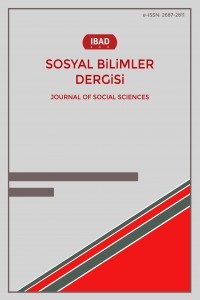Doris Lessing’in Türkü Söylüyor Otlar ve Margaret Atwood’un Evlenilecek Kadın Romanlarında Ataerkil Boyunduruk Altındaki Kadınlar ve Doğa
Ekofeminizm, ataerkil dünya görüşlerine ve insanmerkezci ideolojiye meydan okuyarak ve insanlar, insan olmayan varlıklar ve doğal dünya arasında yeni ve daha uyumlu ilişkileri savunarak cinsiyetler ve çevresel bozulmalar arasındaki bağlantıyı anlamaya çalışır. İnsanmerkezcilik ve ataerkillik, erkeklerin kadınlara ve doğal dünyaya ezilmesinin başlıca nedenleri olarak gösterilmekte ve çözüm olarak biyomerkezci bir dünya görüşü savunulmaktadır. Doris Lessing'in Türkü Söylüyor Otlar ve Margaret Atwood'un Evlenilecek Kadın romanlarını karşılaştıran bu çalışma, her iki romanda da kadınların ve doğal dünyanın paylaştığı trajik sonlara odaklanmaktadır. Ekofeminizm perspektifinden yeniden okudunduğuna, her iki roman da kadınların ve doğal dünyanın refahına yönelik ortak bir kaygıyı ve aynı zamanda ataerkil toplumun her ikisi üzerindeki yıkıcı etkilerinin eleştirisini ortaya koymaktadır.
Anahtar Kelimeler:
ataerkillik, insanmerkezcilik, boyunduruk, ekofeminizm
Patriarchal Subordination of Women and Nature in Doris Lessing’s The Grass is Singing and Margaret Atwood’s The Edible Woman
By challenging patriarchal worldviews and anthropocentric ideology and advocating for new, more harmonious relationships among humans, non-humans, and the natural world, ecofeminism tries to understand the connection between genders and environmental degradation. Anthropocentrism and patriarchy are shown to be the primary causes of the oppression of women and the natural world by men, and a biocentric worldview is advocated as a solution. This study, which compares Doris Lessing's The Grass is Singing and Margaret Atwood's The Edible Woman, focuses on the tragic endings shared by women and the natural world in both novels. When reexamined via the lens of ecofeminism, the two works reveal a shared concern for the welfare of women and the natural world, as well as a critique of patriarchal society's destructive effects on both.
Keywords:
patriarchy, anthropocentrism, subordination, ecofeminism,
___
- Acar, P. (2019). An ecofeminist reading of Herland, The Edible Woman and Woman on the Edge of Time. Master’s Thesis, Celal Bayar University, Manisa.
- Adams, C. J. & Gruen, L. (2022). Ecofeminist footings. Carol J. Adams & Lori Gruen (Eds), In Ecofeminism: Feminist intersections with other animals and the earth (pp. 1-43). Bloomsbury Academic.
- Atwood, M. (2010). The Edible Woman. Emblem.
- Bornancin, E. (2019). Breakdown as breakthrough: Female emancipation in Margaret Atwood’s The Edible Woman and Surfacing. Master’s Thesis, Universita Ca’Foscari Venezia, Venice.
- Carroll, V. P. (2018). Introduction: Ecofeminist dialogues. Douglas A. Vakoch & Sam Mickey (Eds), In Ecofeminism in dialogue (pp. 1-12). Lexington Books.
- Davies, M. (2006). Margaret Atwood’s female bodies. Corall Ann Howells (Ed), In The Cambridge companion to Margaret Atwood (pp. 58-71). Cambridge University Press.
- Divya, S. (nd). An extended literary evocation of South Africa: Interpreting neo-humanism in Doris Lessing’s fiction. Archers and Elevators Publishing House.
- Fishburn, K. (1994). The manichean allegories of Doris Lessing’s “The Grass is Singing.” Research in African Literatures, 25(4), 1-15.
- Gautam, V. & Sinha, J. (2012). Female self-enslavement in Margaret Atwood’s The Edible Woman. Academic Research International, 2(1), 705-709.
- Howells, C. A. (1996). Margaret Atwood. Macmillan Education.
- Iheka, C. (2018). Dispossesion, postcolonial ecocriticism, and Doris Lessing’s The Grass is Singing. ISLE: Interdisciplinary Studies in Literature and Environment, 25(4), 664-680.
- Kheel, M. (1993). From heroic to holistic ethics: The ecofeminist challenge. Greta Gaard (Ed), In Ecofeminism: Women, animals, nature (pp. 243-271). Toronto University Press.
- Lakshmi, V. (2022). Consumption of woman and nature: An ecofeminist reading of Margaret Atwood’s The Edible Woman. Research Journal of English Language and Literature, 10(1), 254-259.
- Lerner, G. (1986). The creation of patriarchy. Oxford University Press.
- Lessing, D. (1973). The Grass is Singing. Heinemann.
- Macpherson, H. S. (2010). The Cambridge introduction to Margaret Atwood. Cambridge University Press. McWilliams, E. (2016). Margaret Atwood and the female bildungsroman. Routledge.
- Merchant, C. (1980). The death of nature: Women, ecology, and the scientific revolution. Harper and Row, Publishers.
- Mir, Y. A. (2019). Resuscitating ecofeminism in The Edible Woman. International Journal of English Language, Literature and Translation Studies, 6(4), 1-4.
- Mondal, S. & Dey, S. (2022). Role of literature in environment making. Tawhida Akhter & Tariq Ahmad Bhat (Eds), In Literature and nature (pp. 22-90). Cambridge Scholars Publishing.
- Murphy, P. D. (2023). Ecofeminism and literature. Douglas A. Vakoch (Ed), In The Routledge handbook of ecofeminism and literature (pp. 1-14). Routledge.
- Mutekwa, A. & Musanga, T. (2013). Subalternizing and reclaiming ecocentric environmental discourse in Zimbabwean literature: (Re)reading Doris Lessing’s The Grass is Singing and Chenjerai Hove’s Ancestors. ISLE: Interdisciplinary Studies in Literature and Environment, 20(2), 239-257.
- Parker, E. (1995). You are what you eat: The politics of eating in the novels of Margaret Atwood. Twentieth Century Literature, 41(3), 349-368.
- Plumwood, V. (2003). Feminism and the mastery of nature. Routledge.
- Pundir, L. (2012). Marian’s search for self in Margaret Atwood’s The Edible Woman. The Criterion: An International Journal in English, 3(4), 1-4.
- Royanian, S. & Yazdani, Z. (2011). Metaphor of body in Margaret Atwood’s The Edible Woman. The Criterion: An International Journal of English, 2(2), 1-8.
- Tolan, F. (2007). Margaret Atwood: Feminism and fiction. Rodopi.
- Uğurel Özdemir, E. (2019). Postmodern feminist treatment of the female body: Subversion of somatophobia through eating disorders in Atwood’s The Edible Woman, Weldon’s The Fat Woman’s Joke, and Green’s Jemima J. Phd Dissertation, Erciyes University, Kayseri.
- Zimmer, J. (2021). Rejecting meat, resisting violence: Feminism and animal advocacy in Margaret Atwood’s The Edible Woman and Ruth Ozeki’s My Year of Meats. Master’s Thesis, University of Oslo, Oslo.
- Yayın Aralığı: Yılda 2 Sayı
- Başlangıç: 2016
- Yayıncı: Hayrullah KAHYA
Sayıdaki Diğer Makaleler
Ela AYDIN, Fethiye KARSLI BAYDERE
Aksanlı Sinemada Yersiz Yurtsuzlar: Küçük Filistin (Kuşatma Günlüğü) (2021)
Öğretmenlerin Yenilenen Kariyer Basamakları Uygulaması Hakkındaki Görüşleri
Geleneksel Türk Kültürünün İzlerini Neşet Günal’ın Resimlerinde Aramak
Gültekin AKENGİN, Mehmet Hilmi ULUSOY, Güler ARIK
Anne ve Babaların Çocuk Yetiştirme Tutumlarını Etkileyen Faktörlerin CHAID Analiziyle İncelenmesi
Abdulkadir KALAYLI, Gülümser GÜLTEKİN AKDUMAN, Arzu ÖZYÜREK
Dijital Oyunlarla Fen Öğretiminin Öğrencilerin Bilişsel Yapılarına ve Kavramsal Değişimlere Etkisi
